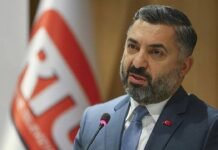Prominent Turkish journalist Fatih Altaylı said Turkey’s broadcasting watchdog, the Radio and Television Supreme Council (RTÜK), has denied his request to air a humanitarian aid program for victims of a deadly earthquake that killed thousands in Turkey and Syria.
“I wanted to broadcast a TV program for the earthquake victims with the participation of artists, soccer players, scientists, professors and businessmen from Turkey and abroad. We wanted to start a campaign to meet some of the needs after the earthquake. Our goal was to buy as many container houses as possible. But at the last minute, with an instruction from RTÜK, we were told not to do that,” Altaylı said during his TV program on Wednesday.
Fatih Altaylı: "Bu akşam yerli yabancı sporcular, iş adamları bilimadamları ile depremzedeler için bir yardım yayını yapacaktık. Amacımız birkaç bin tane Konteyner ev almaktı. Son dakikada RTÜK’ten bir talimat geldi ''Yapmayın'' dediler."
— Bee Haber (@beehaber) February 8, 2023
In response to Altaylı’s statement, RTÜK President Ebubekir Şahin said Altaylı was manipulating the situation and that the program he was talking about was not allowed because they were planning a bigger one with other TV stations.
RTÜK is a controversial agency that is accused of contributing to increasing censorship in the country by imposing punitive and disproportionate sanctions or bans on independent television and radio stations critical of the Turkish government.
A magnitude-7.8 earthquake struck Turkey and Syria in the early morning hours of Monday, followed by numerous aftershocks and a magnitude-7.5 temblor some nine hours later, that killed more than 17,500 people, leveled buildings while many were still asleep and triggered tremors felt as far away as Egypt and the island of Cyprus.
It was one of the most powerful to hit the region in at least a century, affecting southeastern parts of Turkey that are home to millions of refugees from Syria and other war-torn parts of the world.
Turkey has declared a level-four emergency and asked for international assistance through the EU’s Emergency Response Coordination Centre.















